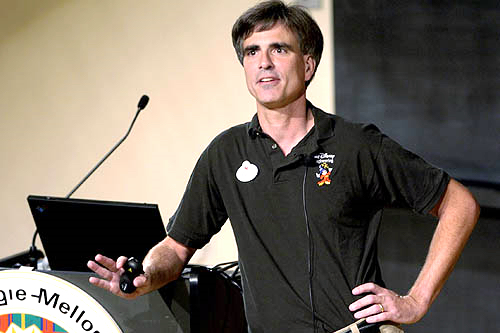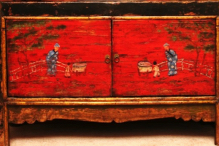"Petty Man Understands Profit"
|
There I was taking my blood pressure, which is taken twice a day for the past several years. I keep a record of the readings, and, every six months, Dr. Marchand meticulously checks every reading.
However, last week, I went through the routine without really thinking. Then it happened. Another one of my treasures started to talk to me. It was my wooden carving of Confucius, which I got in China several years ago. The first thing Confucius said seemed odd, "I'm not cold." His statement caught me off guard. I wasn't cold either, and my hesitation caused the statue to be more clear. Confucius said that his sarcastic comment was questioning why I often drape a shirt on the statue rather than hang it up in the closet.
I told Confucius that he and the Donald seemed to like sarcasm. After I made that off-handed comment, I thought that I shouldn't have said anything. Fortunately, Confucius dismissed my comment with his next observation, "You generally seem quite neat. Everything in this house is put away and stored nicely except for the shirts that you wore during the day. Often, you just throw them on me until you either hang them up the next day or wash them."
The Confucius added, "Allen, you might want to write an essay about one of my analects: 'The gentleman understands what is right, whereas the petty man understands profit.' You can tell your reader that Confucius said that. Actually, you can tell your readers that it is applicable to the Donald as you call Trump." 
I apologized to Confucius for my behavior. I told him that some guys have chair clothing racks on which they can hang a shirt or coat behind the chair. Therefore, my hanging my shirt on him was just my attempt at humor. I took off the shirt and hung it in the closet. Then Confucius mentioned that many of my treasures came from places throughout Asia. However, he commented about Turner's The Fighting Téméraire hanging on the wall behind him. He said, "The Fighting Téméraire isn't Asian."
I told the statue that I am very eclectic. I admitted that most of my treasures are interspersed with each other regardless of where they came from. Actually, my bedroom contains things from French Polynesia, England, and China. I have only one room that has solely things from Tibet and China. Confucius asked, "Why is it that you enjoy things from Asia. You are Scottish; the only thing that I see from Scotland is a porcelain Loch Ness Monster.
I explained because of my ethnic background, I actually studied a year in Scotland after graduate school in the States. I spent the summers before and after that year traveling all over Europe and a part of North Africa. In the past several decades, I have run tours to Greece, Turkey, and Egypt. I have traveled on my own in Africa and have been on tours in India, Indochina, and China. Confucius again pushed his question about why Asia and not Europe. I responded that I have been fascinated about all Asian countries. I was given the opportunity to teach a class on China. In fact, the university allowed me to pick the textbook, write the course including a PPP, and select the various cities throughout China and Tibet that we would visit during the class. I told Confucius that I would still like to visit Mongolia. However, the draw is in part that Asia is different than what I am used to. I have gone to parts of Asia that very few Americans have ever visited. Actually, I want to return to Myanmar. The Confucius said, "You seem healthy. You take your medication for your blood pressure problems, therefore, "you are good to go" as you Americans say. I told Confucius that my heart is fine. In addition, I eat properly and exercise daily. However, nearly a decade ago, I danced with death twice. Those two events woke me up to the reality that I'm not immortal. Actually, I am more alive now than back in the 60s during the civil rights movement. The next thing that Confucius said was that "A journey of a thousand miles begins with a single step." I agreed with him. However, I mentioned that people are often fearful or scared to dream dreams about faraway places and therefore don't take that first step.
Then the statue added a very famous saying of his, "The hardest thing of all is to find a black cat in a dark room, especially if there is no cat." I merely added that the cat is fear, and, in reality, you don't have to fear traveling overseas or traveling across town. Confucius again went back to another famous analect, "A lion chased me up a tree, and I greatly enjoyed the view from the top." Then he added, "Problems and fears are either issues that cause people to sit inside the safety of their homes or it is an opportunity to seize the opportunity." I agreed. It is up to us how we see issues in life. We can see the negative aspects of the problem or there are often positive aspects to the problem. It goes back to the saying, "No pain, no gain." Finally, Confucius added a postscript, "You are always talking about Teddy Roosevelt's Man in the Arena speech. He told the world to dare greatly." Again, he added, "Our greatest glory is not in never falling, but in rising every time we fall."
Visit the On Seeing the Light page to read more about this topic.
Visit the The Last Lecture page to read more about this topic.
Visit the Dancing with Death page to read more about this topic.
Visit the Talking with Objects page to read more about this topic.
Visit the Man in the Arena page to read more about this topic.
Visit the Confucius Said page to read more about this topic. 09/14/16 Follow @mountain_and_me |


















